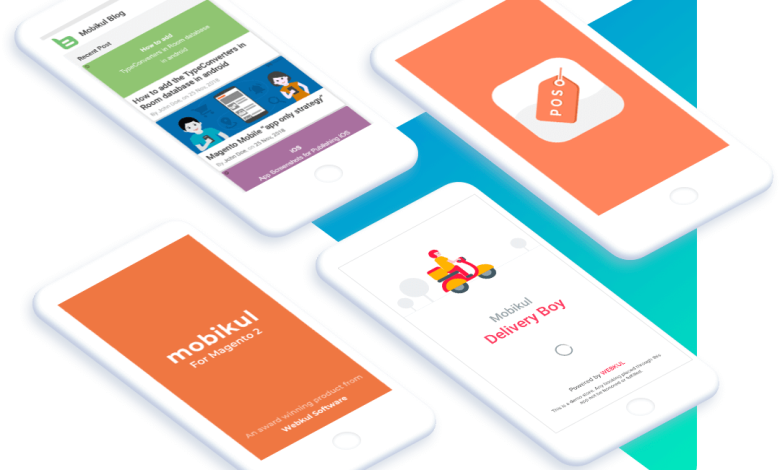Revolutionizing Your Magento 2 Store with Progressive
Web Apps (PWAs) Progressive Web App (PWAs) is a new class of websites that use modern web capabilities to deliver an app-like experience. It is a fusion between the features of web and mobile apps.

Magento introduced Magento PWA Studio on 28th November 2018 which offers the required tools for developers to develop, deploy, and maintain a PWA storefront on top of Magento 2.3 and above.
Progressive Web App is a new class of websites that use modern web capabilities to deliver an applike user experience. It is a fusion between the features of web pages and mobile apps. This generation’s tech savvy customers demand a quick, light and app-like browsing experience over digital commerce.
To address these requirements of the mobile device customers the latest ongoing trend that is Progressive Web App (PWA) was developed. It offers to transform mobile shopping into an appealing, involving and lightning fast experience. Prime companies like Pinterest, Instagram, Twitter, Forbes, Starbucks, Uber, and the Washington Post have all released PWAs.
What is PWA?
The simplest explanation could be that they provide an native app-like experience over eCommerce websites. Progressive Web Apps take advantage of service worker caching, push notifications, application manifest and background synchronisation.
Its development is far less expensive than that of a native app. They work in a browser, so unlike native apps, PWAs don’t require to be downloaded from an app store instead a shortcut or icon is added to the user’s mobile home screen.
When opening a web app from a mobile device the customer is prompted a popup asking to add the app on the home screen. After this, the customers can directly access your eCommerce store through that shortcut or icon which got added to their mobile home screens without even opening a browser.
Technologies used in developing Progressive Web Applications are:
Service Workers
These are the JavaScript programs that run independently of web pages and can intercept network requests. These are just like web workers but can be accessed by main threads that are running in different browser tabs at the same time.
Cache API
As the name suggests, it caches the types of request/response objects that PWAs assist upon. It is a system for storing and retrieving network requests and their responses. It was created to enable Service Workers to cache network requests so as to supply appropriate responses even while offline.
Web Push Notifications
Web Push notifications are notifications or messages that come from a web application. The customer gets them on its browser, desktop, or mobile device when the online application isn’t running within the browser.
Web App Manifest
Web App Manifest may be a JSON file that tells the mobile browser about the PWA and the way it should respond when installed on the user’s desktop or mobile device.
Reasons to use Magento 2 PWA for eCommerce development
When looking at the engagement rate, native applications dominate a user’s mobile screen time accounting for 87% while mere 13% is left for websites. Though mobile web has a huge reach but because of the lack of rich user experience on websites, re-engaging of the user is difficult. It was found that on an average, a user abandons a website if it takes longer than 3 seconds to load.
In the same study it was also found that 80% of the time spent in native apps is grabbed by just three apps which are mostly social media apps. This proves that it’s very difficult for an eCommerce business’ native app to make a spot in a customer’s mobile.
This is where PWA comes into play.
Market Statistics of PWA:
- PWAs have shown 36% higher conversion rates as compared to native apps.
- 50% higher customer engagement.
- Faster page loading up to 10 times.
- PWA development cost is 4 times lesser than that of native app development.
- With a PWA, AliExpress experienced an 104% increase in conversion rate for new users.
- BookMyShow experienced an 80% increase in conversion rate.
- OLX got a significant decrease in bounce rates by 80%.
Why a merchant must opt for Magento 2 PWA extension for the eCommerce business?
Look and feel like native apps
There’s been a significant rise in mobile users for eCommerce shopping. But not every business can bear the expense to develop a mobile application. PWAs being considerably cheaper to develop and cross-platform by default makes them excellent alternatives to mobile applications. There is no need to develop separate apps for Android and iOS.
Add to the home screen
PWA site can be installed and the app icon gets added to the home screen of the mobile device. Now users can directly click on this icon to access the website instead of first opening the browser and then searching for the website.
Responsive design
PWA provides a consistent experience across multiple devices like desktop, tablet, and mobile phones. Sites with responsive web design rank better in Google search.
Push notifications
Push notifications are messages that are sent to customers as notifications. They are important to eCommerce businesses to keep their customers informed whenever there’s new content available. They can increase user re-engagement.
Cross-Platform compatibility
PWAs can run on most browsers including Chrome, Safari, Edge, and Firefox. PWAs can also run on multiple platforms, including desktops. There is no need to develop and maintain apps for different platforms. Furthermore, PWAs can deliver updates in real-time just like a website so it doesn’t require to be updated from the app store.
Remarkable speed
Speed is one vital factor for online stores. PWAs are faster because of service workers. Service workers precache part of the web app, now when the user opens it the next time it loads instantly.
Offline support
PWA works offline. With no or poor network connection, customers can still browse your eCommerce website and add products to the cart, provided they have previously visited those pages. Even orders can be placed but they will be processed once the internet connection is restored.
Secure
Uses HTTPS connections to ensure no tampering with the content.
Shareable content
In a PWA site, there’s a unique URL for every page that can be shared on social media and other apps.
SEO-friendly
Another significant advantage of PWA is in terms of SEO. As the site content is discoverable through search engine hence sites that have mobile-friendly versions perform well in rankings as they are indexed first.
Why Progressive Web Apps are the Future?
Many major companies are now shifting their focus towards PWAs and we can see why. Comparing the advantages and disadvantages, PWA seems more effective and powerful than native apps and mobile sites.
Recent trends show users are turning away from apps. According to one research smartphone owners download an average of zero apps per month.
PWA can potentially take the place of many native apps that exist today. This can also significantly improve mobile web properties.




